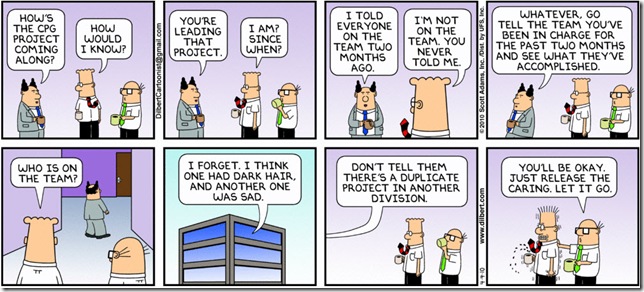One of the most crucial times in a project lifecycle is during the Initiation stage - this is the time in between a project when the company has just won the project and when they are ready to start.
...

One of the most crucial times in a project lifecycle is during the Initiation stage - this is the time in between a project when the company has just won the project and when they are ready to start.
...

What’s a risk? How does one manage risks? What is the best method to track risks for a project? Is there a standard categorization to use? What is the difference between a risk and an issue? The list goes on and on.
Risk management can be tricky, but having some sort of process on how to manage risks for any project in your organization is extremely important. Identifying, prioritizing and addressing risks for a project, is a fundamental principle that shouldn't be overlooked. If not properly addressed, it can result in slipped schedules...

We’ve all heard that Content is King (sounds a little misogynistic if you ask me), so the practice (art, really) of planning, developing and managing your royal highness is the knight in shining armor.
Can You Use it in a Sentence?
So, what exactly is Content Strategy, anyway? If you Google “Content Strategy” you’re sure to find a plethora of definitions and will probably fall down a Wikipedia rabbit hole, so we’ll do the hard work for you. In an interview with...

Recently one of our clients had an outdated version of Splunk and needed to upgrade to a newer version of Splunk Enterprise that incorporated additional features and security updates. This of course is a very important procedure that many Splunk customers will have to learn over their time using Splunk. In this blog I will outline the process used for upgrading distributed deployments of Splunk.

In 2014, Function1 set on the path to create a Project Management Office (PMO) for our growing company. This is a huge step in any firm that requires a lot of effort, but can have a significantly positive impact on the firm’s overall performance. So what leads a company to decide it’s time to have a PMO?
...

Splunk is a journey. Whether you are a newbie playing around with Splunk on your local machine or have a multi-instance distributed Splunk deployment, your knowledge of Splunk is always evolving. Typically, the more you know about Splunk, the more you want to do with Splunk. Often, proof of concepts (POCs) turn into production environments and soon enough you’re increasing your license and looking into new architecture. Congratulations, you have become a full on Splunk ninja! Now, how do we migrate your current Splunk deployment to ‘beefier’ hardware,...

Does your organization emphasize the importance of lessons learned? Aside from occasional references to past project failures, few organizations give much thought to learning about the past. In my experience, this is a best practice area that is most often minimized or entirely overlooked. Lessons learned process is one that crosses functional boundaries and allows an organization to learn from both its mistakes and its successes. An effective process should prevent us from repeating mistakes and ensure that we continue to use methods that were successful. It should be an instrumental...

Recently, we worked with a client that was using a multi-tiered storage configuration for their Splunk deployment. One tier was used for hot/warm data and the other tier for cold storage. We wanted to test the cold storage tier specifically. We used the Splunk event generator to produce data and tweaked some index settings to generate buckets (if you haven’t used the event generator before, here's a previous blog post for reference).
In the...

What does it take to manage a project? You’d think by now the answer should be well established, but it’s still a gray area for many. Even though it is integrated into most professional work environments, project management is still surrounded by a lot of misconceptions and myths. There are so many opinions out there as to what project management is about (or not about) and some are more common than others. On a previous project I was working on, the customer saw no value in having a project manager. He felt that project managers just got in the way of his team’s ability to complete...

Burnt orange autumn leaves. Crystal blue Caribbean waves. Rolling yellow fields of sunflowers. Much like the sense of smell, colors have the ability to evoke powerful and distinct emotional responses. Though sometimes a source of controversy, color psychology as it pertains to marketing can have a persuasive influence on the end consumer (or end user in the case of web design).
Web designers have a lot to consider when it comes to developing their masterpieces, including (but not limited to) content, navigation, accessibility, functionality, responsive adaptation, the list goes on....
